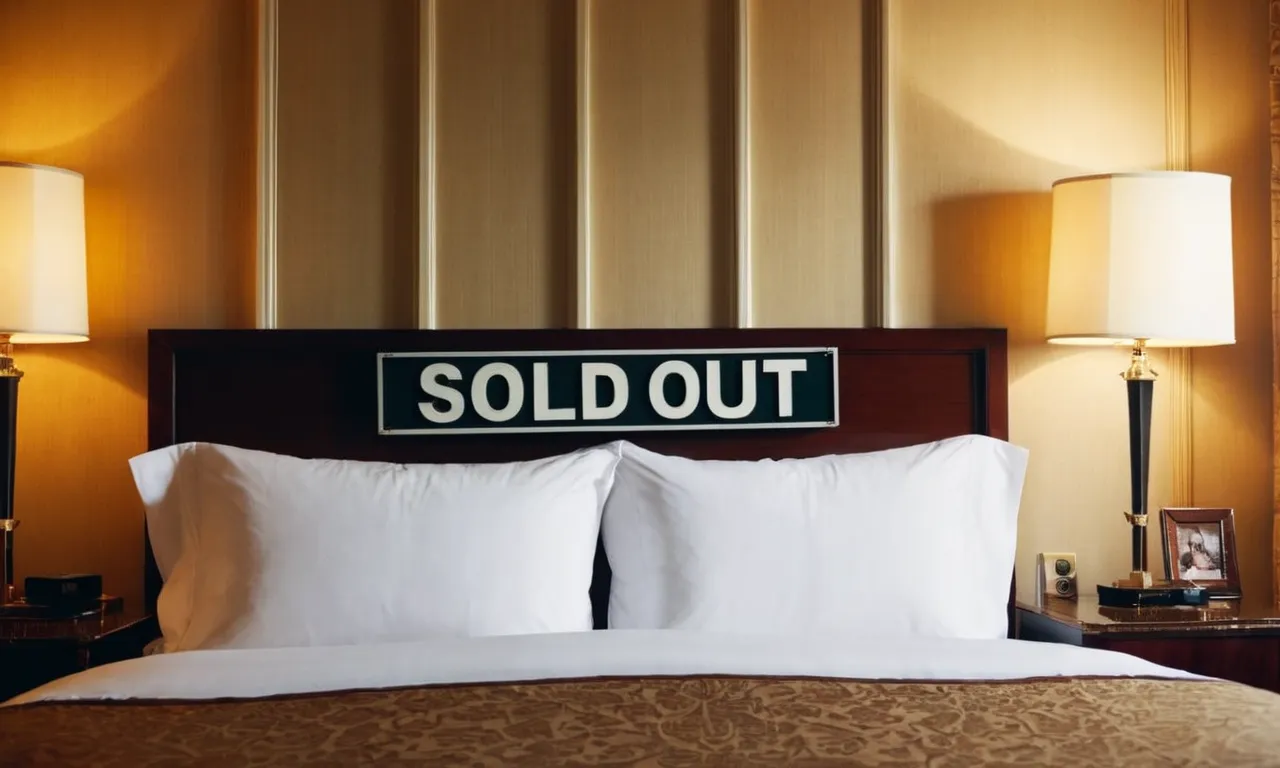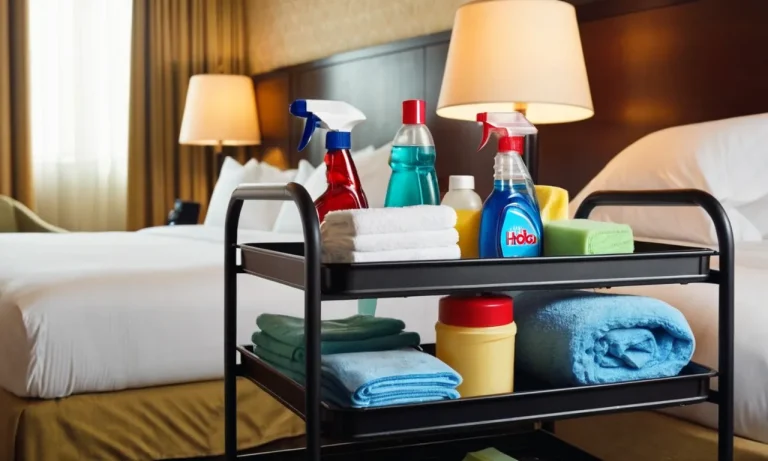What Does Sell Out Mean In Hotel: A Comprehensive Guide
Have you ever tried to book a hotel room only to find that the property is ‘sold out’? This term can be frustrating for travelers, but it’s an essential part of the hotel industry’s vocabulary. Understanding what ‘sell out’ means in the context of hotels can help you plan your trips more effectively and avoid disappointment.
If you’re short on time, here’s a quick answer to your question: When a hotel is ‘sold out,’ it means that all available rooms have been booked, and no more reservations can be accepted for the specified dates.
In this comprehensive guide, we’ll explore the concept of ‘sell out’ in hotels, its implications for travelers, and strategies for securing accommodations during peak periods. We’ll also delve into related topics such as overbooking, room types, and pricing strategies.
Understanding Hotel Sell Out
What is a Hotel Sell Out?
A hotel sell out refers to a situation where a property has no more rooms available for a given date or period. In other words, the hotel has reached its maximum occupancy, and all rooms have been booked.
This can happen for various reasons, such as high demand during peak travel seasons, major events or conferences in the area, or simply limited room inventory. When a hotel is sold out, it cannot accommodate any additional guests until existing reservations are checked out and rooms become available again.
Factors Contributing to Sell Outs
Several factors can contribute to a hotel selling out, including:
- Popular travel destinations and seasons: Hotels in high-demand tourist destinations or during peak travel seasons, such as summer or holidays, are more likely to sell out quickly. According to Statista, the average hotel occupancy rate in the US was around 63% in 2022, indicating a significant demand for hotel rooms.
- Major events and conferences: When a city hosts a large event, convention, or conference, hotels in the area can sell out due to the influx of attendees. For example, during major events like the Super Bowl or the Oscars, hotels near the venues often experience high occupancy rates and sell outs.
- Limited room inventory: Hotels with a smaller number of rooms are more susceptible to sell outs, especially during peak periods or when a significant portion of their rooms are already booked.
Implications for Travelers
When hotels sell out, it can have significant implications for travelers. First and foremost, it becomes challenging to find accommodations in the desired location or at the preferred hotel. This can lead to higher prices for the remaining available rooms or the need to consider alternative locations or lower-rated hotels.
Additionally, sell outs can disrupt travel plans, causing inconvenience and potential additional costs for travelers. To avoid such situations, it’s recommended to book accommodations well in advance, especially during peak travel periods or when attending major events. Travelers can also consider exploring alternative accommodation options, such as vacation rentals or home-sharing platforms like Airbnb, to increase their chances of finding suitable lodging.
By understanding the concept of hotel sell outs and planning accordingly, travelers can better navigate the challenges and ensure a smoother and more enjoyable trip. 😎
Room Types and Sell Out Dynamics
Standard Rooms vs. Suites
Hotels typically offer a variety of room types to cater to different guest preferences and budgets. Standard rooms, also known as basic or standard-level rooms, are the most common and affordable option.
They usually come with basic amenities like a bed, bathroom, TV, and sometimes a small seating area. On the other hand, suites are more spacious and luxurious, often featuring separate living and sleeping areas, a kitchenette, and additional amenities like a whirlpool tub or a private balcony.
Suites are generally more expensive than standard rooms, but they provide a more comfortable and upscale experience for guests willing to pay a premium.
During peak periods or major events, hotels may sell out their standard rooms first, as they are in higher demand due to their lower price point. However, savvy travelers may opt for suites if they can find a good deal, as hotels sometimes offer discounted suite rates to fill these premium rooms when standard rooms are sold out.
The balance between standard rooms and suites can greatly impact a hotel’s revenue and occupancy rates.
Occupancy Rates and Room Availability
Occupancy rates are a key metric used by hotels to measure their performance and determine room availability. A high occupancy rate means that a significant portion of the hotel’s rooms are booked, while a low occupancy rate indicates more vacant rooms.
According to Hotel News Resource, the average occupancy rate for hotels in the United States was around 66% in 2022, with rates varying by location and season.
When a hotel reaches a high occupancy rate, it may sell out of certain room types or even completely sell out, meaning all rooms are booked. This can happen during popular events, holidays, or peak travel seasons.
During these times, hotels may implement dynamic pricing strategies to maximize revenue by adjusting room rates based on demand. 🤑
Pricing Strategies During Sell Outs
- Demand-based pricing: Hotels can increase room rates when demand is high and occupancy levels are nearing capacity. This strategy allows them to capitalize on the limited availability and maximize revenue.
- Length-of-stay pricing: Some hotels may offer discounted rates for guests who book longer stays, even during sell-out periods. This helps to fill rooms and generate revenue over an extended period.
- Package deals: Hotels can bundle room rates with additional services or amenities, such as spa treatments or dining credits, to create attractive package deals that justify higher prices during sell-outs.
It’s important to note that pricing strategies during sell-outs can vary greatly depending on the hotel’s location, brand, and target market. Some hotels may prioritize maintaining a consistent brand image and guest experience over maximizing revenue during peak periods.
Ultimately, the goal is to strike a balance between optimizing revenue and ensuring guest satisfaction. 😊
| Room Type | Average Daily Rate (ADR) | Occupancy Rate |
|---|---|---|
| Standard Room | $150 | 75% |
| Suite | $300 | 60% |
Overbooking and Its Impact on Sell Outs
What is Overbooking?
Overbooking is a common practice in the hotel industry where hotels intentionally accept more reservations than the actual number of rooms available. This strategy is employed to compensate for last-minute cancellations and no-shows, ensuring that every room is occupied and maximizing revenue.
However, overbooking can also lead to potential issues and disappointments for travelers.
Reasons for Overbooking
There are several reasons why hotels resort to overbooking:
- To offset the impact of cancellations and no-shows, which can account for up to 15-20% of reservations in some cases, according to HospitalityNet.
- To maximize occupancy rates and revenue, as an empty room represents lost potential income.
- To account for early check-outs or guests extending their stays unexpectedly.
Hotels carefully analyze historical data and employ sophisticated algorithms to determine optimal overbooking levels, ensuring they don’t overcommit too much and risk turning away guests.
Consequences of Overbooking for Travelers
While overbooking can be a necessary evil for hotels, it can also have negative consequences for travelers. If a hotel is overbooked, they may have to “walk” guests to another property, which can be inconvenient and disappointing, especially if the alternative accommodation is of lower quality or farther away.
In such situations, hotels are typically required to compensate the affected guests, either by covering the cost of the alternative accommodation or offering other forms of compensation, such as discounts or vouchers for future stays.
To mitigate the impact of overbooking, savvy travelers can take proactive measures. For example, checking in early or booking directly with the hotel (as opposed to third-party sites) can increase the chances of securing a room.
Additionally, joining hotel loyalty programs or booking higher-tier rooms can also provide a buffer against overbooking. However, even with these precautions, the possibility of being “walked” can never be entirely eliminated when hotels overbook. 😕
Strategies for Securing Accommodations During Sell Outs
Hotel sell outs can be a frustrating experience for travelers, but with the right strategies, you can increase your chances of securing accommodations during peak periods. Here are some effective approaches to consider:
Book Early for Popular Destinations
For highly sought-after destinations or events, it’s crucial to plan ahead and make reservations well in advance. According to a study by TripSavvy, booking at least 6 months in advance can save you up to 21% on hotel rates and ensure availability.
Popular destinations like New York City during New Year’s Eve or Orlando during school breaks tend to sell out quickly, so early booking is a must.
Consider Alternative Locations
If your desired location is sold out, explore nearby areas or alternative cities. You might find better availability and potentially lower rates. Websites like Booking.com and Hotels.com offer convenient search tools that allow you to view hotels within a radius of your desired location.
This strategy can open up more options and provide a unique travel experience.
Leverage Hotel Loyalty Programs
Being a member of hotel loyalty programs can give you an edge during sell outs. Many hotel chains prioritize room availability for their loyal members, offering them exclusive access to inventory and discounted rates.
Programs like Marriott Bonvoy and Hilton Honors can be invaluable resources during peak travel periods. Additionally, some programs even allow you to bid for unsold rooms or request room upgrades. 😊
Monitor for Cancellations and Last-Minute Availability
Cancellations are inevitable, so keep an eye out for last-minute availability. Many hotels release cancelled rooms back into their inventory, providing a second chance for travelers. Consider setting up price alerts or subscribing to hotel email lists to be notified of any openings.
You can also try calling the hotel directly to inquire about cancellations or waitlists. Being persistent and flexible can sometimes pay off when it comes to securing accommodations during sell outs.
By employing these strategies, you’ll increase your chances of finding suitable accommodations, even during the busiest travel periods. Remember, patience, flexibility, and a proactive approach can go a long way in navigating the challenges of hotel sell outs. Happy travels! 🎉
Conclusion
Navigating hotel sell outs can be challenging, but understanding the underlying dynamics can help travelers make informed decisions and increase their chances of securing desired accommodations. By booking early, considering alternative locations, leveraging loyalty programs, and monitoring for cancellations, travelers can overcome the obstacles posed by sell outs and enjoy a seamless travel experience.
Ultimately, the concept of ‘sell out’ in hotels is a reflection of supply and demand dynamics, and it serves as a reminder for travelers to plan ahead and remain flexible when exploring popular destinations during peak seasons.
With the right strategies and a bit of persistence, finding suitable accommodations is achievable, even in the face of sell outs.








